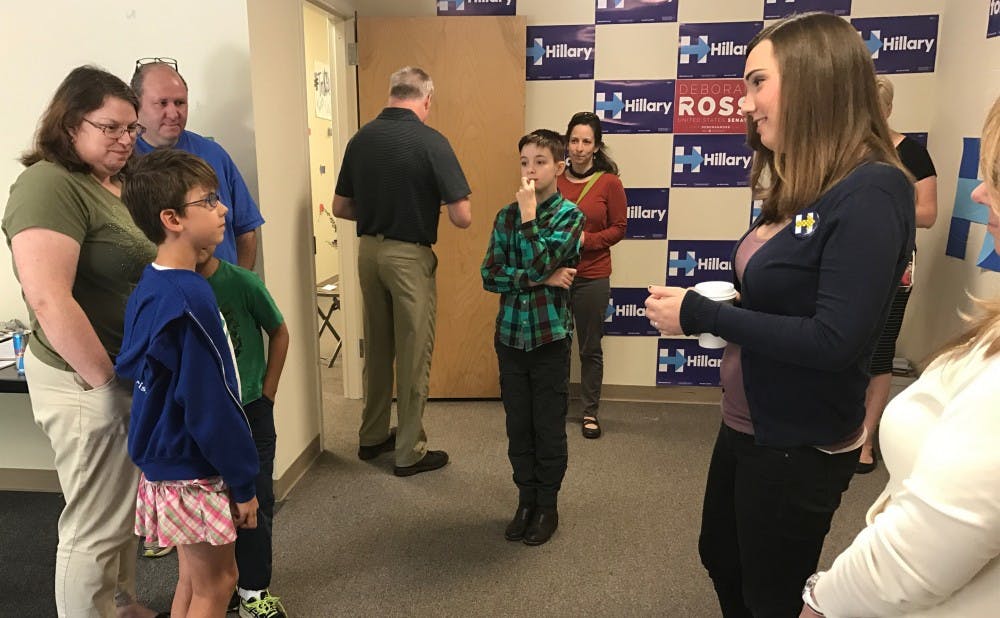Sarah McBride, an LGBTQ+ rights activist and national press secretary for the Human Rights Campaign, campaigned for Democratic presidential candidate Hillary Clinton in Raleigh Sunday. In 2012 at American University, McBride came out as transgender and this summer spoke at the 2016 Democratic National Convention, becoming the first openly transgender person to make an address at a major party convention. The Chronicle spoke with McBride about House Bill 2, the controversial North Carolina law that restricts bathroom use to a person’s biological sex, and transgender rights on college campuses.
The Chronicle: What have been the most important issues to you personally in this election?
Sarah McBride: As someone who works in LGBTQ equality, I think this election really is a pivotal one for the community I belong to. We've seen a lot of progress over the last seven and a half years with President Obama, and all that is at stake.
I think more broadly, this election in North Carolina and around the country really is about what kind of country we’re going to be. [It's about] whether LGBTQ people, whether people of color, whether people with disabilities, whether immigrants or women are wholly respected, protected and treated with dignity and fairness throughout this country. And that’s why I’m so excited to be supporting Hillary.
TC: What do you think the fate of HB2 will be?
SM: My hope is that in the not-too-distant future, HB2 will be relegated to history. It will be a disappointing chapter in the history of a otherwise welcoming and inclusive state. Not only North Carolina but across the country, the politics of division and discrimination and fear are not effective.
My hope is that we will elect a president in Hillary Clinton, who will continue the work of the Obama administration to protect the rights of LGBTQ people, including transgender people, and that North Carolina will elect a governor and legislators who will work to repeal HB2 and who will provide an important safeguard against any kind of other discriminatory action.
North Carolinians, whether LGBTQ or not, have suffered enough because of HB2. The state has lost hundreds of millions of dollars. So my hope is that young people in the future will learn about HB2, but they will see that this election was the turning point for voters in North Carolina.
TC: What do you think about people’s responses to HB2, both in North Carolina and across the country?
SM: I think as tough as this year has been, and as disappointing and hurtful the passage of HB2 has been, I think the reaction from everyday North Carolinians and people across the country in opposition to HB2 has really provided a lot of hope and comfort for LGBTQ people who are struggling.
I think the reactions from so many different people—from donors, from allies, who have steadfastly stood by our side—has really provided a lot of hope and comfort for a lot of people. The most powerful message, the most powerful statement anyone can make against HB2 is to turn out and vote for pro-equality candidates on the ballot.
TC: What do you think of current policies on college campuses related to transgender rights and LGBTQ issues?
SM: I came out as transgender when I was student body president in my own college. It was through my own advocacy that I was able to find the courage and confidence to come out. Our college campuses should be what we want our nation to be in 10, 15 years. If we can change our college campuses, we can change our nation. I think more and more we’re seeing college students rally to the side of their transgender peers, and more and more students are pushing for trans-inclusive curricula and services at their college or university. I think that's really setting an example for people across this country.
TC: What was it like speaking at the Democratic National Convention?
SM: Speaking at the DNC was a surreal experience. It was empowering and inspiring to be part of a convention that I think demonstrated that no matter who you are or who you love or where you come from, this country has a place for you, too. I felt a lot of responsibility in representing the community I loved and in helping to educate country a little bit more about what it means to be transgender.
More than anything else, I hope the convention was that for a little transgender kid in Texas or Kansas or North Carolina, who sees themselves under attack by their own state government, that they see that there are leaders in this country who love them and who respect them.
I think any American who watched the two conventions came away knowing that if you want to move forward, if you want an inclusive and warm and welcoming vision for the country we love, there's really only one person on the ballot who can provide that.
Get The Chronicle straight to your inbox
Sign up for our weekly newsletter. Cancel at any time.

